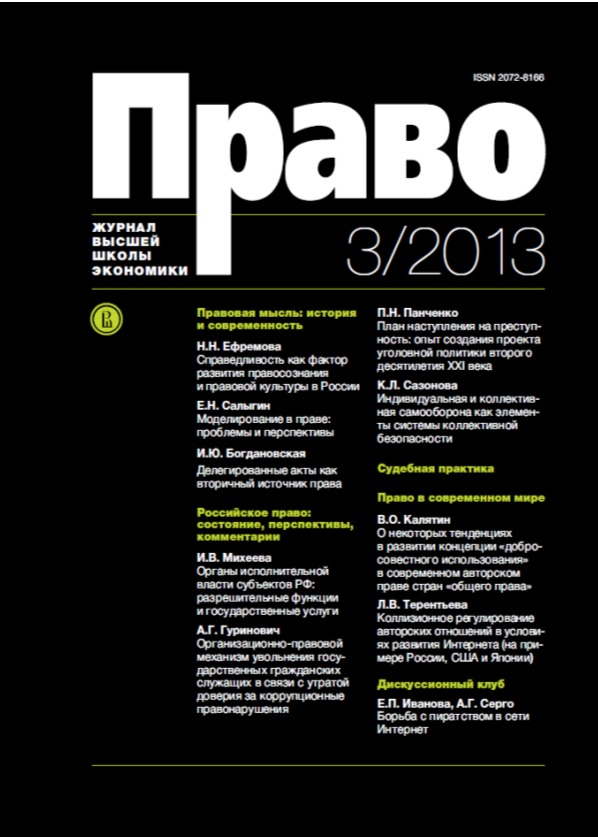On Some Trends in the Development of the Concept of Fair Use in Modern Copyright Law of Common Law Countries
Abstract
The article is devoted to “fair use”/ “fair dealing” doctrine, which in US/UK legal systems permits borrowing of portions of a work and its further use without necessity to obtain consent of the copyright owner. This mechanism provides flexibility in the legal systems and exists to correct “market failures”. However, it is extremely complicated and causes different practical problems. However, these models are unstable and experience serious changes relevant not only to practice but evaluating the general trend of the further development of copyright. US legal system is at the stage of changing paradigm – transfer from interpreting copyright as a special model codifying a compromise for the sake of special public purposes to recognizing the right to entire control of the copyright holder for using a work. In turn, the UK seeking to remove the threat caused by fair use as to business of copyright created the situation in which obstacles for the circulation of information hinder economic development and modernization of the doctrine has got evident drawbacks. However, the attention drawn by the UK cabinet to various narrow aspects of fair dealing has shown recently that widening the doctrine in the UK will not be significant, which would be if the changes were taken only to the extent of which inevitability is recognized by the business community which is conservative. Each of the countries moves its own way but both strive for concretization of terms and conditions of fair use which means a brand-new stage in the development of these doctrines.
References
Aplin T. (2005) Copyright Law in the Digital Society, Portland: Oxford Hart Publishing.
Bell T. (1998) Fared Use v. Fair Use: The Impact of Automated Rights Management on Copyright Fair Use Doctrine. North Carolina Law Review, no 76.
Bently L., Sherman B. (2001) Intellectual Property Law. New York, Oxford University Press, pp. 197-198.
Bessen J., Meurer J. (2008) Patent Failure. How Judges, Bureaucrats, and Lawyers Put Innovators at Risk. New Jersey: Springer. DOI: https://doi.org/10.1515/9781400828692
Boldrin M., Levine D. (2008) Against Intellectual Monopoly. New York, Cambridge University Press. DOI: https://doi.org/10.1017/CBO9780511510854
Burrell R., Coleman A. (2006) Copyright Exceptions. The Digital Impact. Cambridge, Cambridge University Press. DOI: https://doi.org/10.1017/CBO9780511666964
Garnett k., Davies G., Rayner J. (eds.) (1999). Copinger and Skone James on Copyright. London, Sweet & Maxwell.
Gordon W. (1982) Fair Use as Market Failure: a Structural and Economic Analysis of the Betamax Case and its Predecessors. Columbia Law Review, no 8.
Gordon W. (1982) The “Market Failure” and Intellectual Property: A Response To Professor Lunney. 82 B.U.L. Rev. 1031. DOI: https://doi.org/10.2307/1122296
Guilbault L. (2002) Copyright Limitations and Contracts. The Hague, Kluwer.
Joce C., Patry W., Leaffer M., Jaszi P. (1997) Copyright Law. Matthew Bender.
Lessig L. (2006) Code Version.2.0, Basic Biioks. New York.
Litman J. (2000) Digital Copyright. New York: Prometheus Books.
Noguchi Y. (2009) Digital Copyright in the U.S. and Japan. Saarbrucken, VDM Verlag Dr. Muller, p. 85.
Patterson L.R., Lindberg S. (1991) The Nature of Copyright. A Law of User' Rights. London, The University of Georgia Press.
Torremans P. (2010) Intellectual Property Law. Oxford, Oxford University Press.
Weinreb L. (1990) Fair's Fair: A Comment on the Fair Use Doctrine. Harvard Law Review, no 103. DOI: https://doi.org/10.2307/1341458
Copyright (c) 2013 Law Journal of the Higher School of Economics

This work is licensed under a Creative Commons Attribution-ShareAlike 4.0 International License.


















